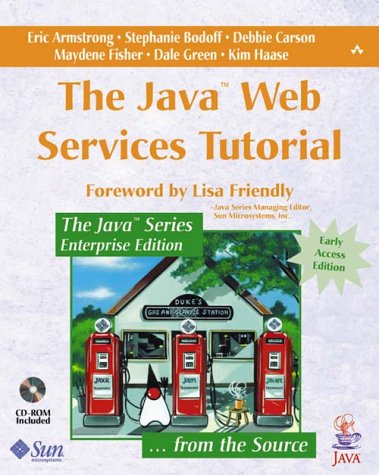
|
FreeComputerBooks.com
Links to Free Computer, Mathematics, Technical Books all over the World
|
|
- Title The Java Web Services Tutorial
- Author(s) Eric Armstrong, et al
- Publisher: Pearson Education (March 15, 2002), eBook (2005)
- Paperback: 528 pages
- eBook: HTML and PDF
- Language: English
- ISBN-10: 0201768119
- ISBN-13: 978-0201768114
- Share This:

|
A beginner's guide to developing web services and web applications using the Java web services developer pack. This complete, ready to use package includes a variety of technologies and tools required to build and deploy comprehensive Web services applications today.
Following in the successful tradition of previous Java Series Tutorials, The Java Web Services Tutorial, Early Access Edition, offers an essential, example-driven resource for every programmer interested in developing and deploying web services and web applications with the Java WSDP.
The authors - senior documentation specialists at Sun - offer a concise, all-in-one guide covering the key technologies for building Web services using the Java 2 Platform.
They provide practical techniques and examples for working with Java Servlets, JSP, JSTL and the Java XML Pack to get programmers up to speed. This tutorial is packed with practical examples to reinforce key concepts.
About the Authors- N/A
- Enterprise Java and and Java EE (J2EE)
- Web Services (SOAP, RESTful, etc)
- Java Web Frameworks, MVC - Srtuts, JSF, Spring MVC, etc
 Similar Books:
Similar Books:
-
 Practical Guide to Building an API Back End with Spring Boot
Practical Guide to Building an API Back End with Spring Boot
Starting your first project with Spring Boot can be a bit daunting given the vast options that it provides. This book will guide you step by step along the way to be a Spring Boot hero in no time.
-
 Introduction to Web Services with Java (Kiet T. Tran)
Introduction to Web Services with Java (Kiet T. Tran)
This book focuses more on the details of a hands-on approach to Web Service programming than its specifications. Many details of the specifications are intentionally glossed over, however, so that the content remains manageable.
-
 The Java EE 7 Tutorial (Eric Jendrock, et al)
The Java EE 7 Tutorial (Eric Jendrock, et al)
This book is a task-oriented, example-driven guide to developing enterprise applications for the Java EE 7. Written by members of the Java EE 7 team at Oracle, it provides new and intermediate Java programmers with a deep understanding of the platform.
-
 Building Reactive Microservices in Java (Clement Escoffier)
Building Reactive Microservices in Java (Clement Escoffier)
This book is for developers and architects interested in developing microservices and distributed applications. It does not explain the basics of distributed systems, but instead focuses on the reactive benefits to build efficient microservice systems.
-
 Microservices for Java Developers: Frameworks and Containers
Microservices for Java Developers: Frameworks and Containers
In this hands-on, example-driven guide, Java developers and architects will learn how to navigate popular application frameworks, such as Dropwizard and Spring Boot, and how to deploy and manage microservices at scale with Linux containers.
-
 Undisturbed REST: A Guide to Designing the Perfect API
Undisturbed REST: A Guide to Designing the Perfect API
Building a RESTful API is easy, but designing an API that meets business objectives, pleases your users, and is long-lived - that's hard. This book tackles these challenges head on, focusing on what you need to know in order to design the perfect API.
-
 InfoQ Explores: REST (InfoQ)
InfoQ Explores: REST (InfoQ)
Introduction to REST (REpresentational State Transfer), the architecture behind the World Wide Web, and covers the key principles: Identifiable resources, links and hypermedia, standard methods, multiple representations and stateless communication.
-
 Designing Great Web APIs (James Higginbotham)
Designing Great Web APIs (James Higginbotham)
With this practical guide, developers, architects, and tech leads will learn how to navigate complex decisions for designing, scaling, marketing, and evolving interoperable APIs. It explains API design theory and provide hands-on exercises.
-
 Dynamic Proxies in Java (Heinz M. Kabutz)
Dynamic Proxies in Java (Heinz M. Kabutz)
Dynamic proxies are such a tool that we can use it to save thousands of lines of repetitive code with a single class. This book is for intermediate to advanced Java programmers who want to get to "guru" status. It is not suitable for beginners in Java.
-
 Java Transaction Design Strategies (Mark Richards)
Java Transaction Design Strategies (Mark Richards)
This book is about how to design an effective transaction management strategy using the transaction models provided by Java-based frameworks such as EJB and Spring. Techniques, best practices, and pitfalls with each transaction model will be described.





